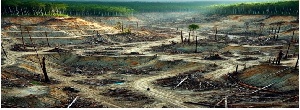- Home - News
- Elections 2024
- News Archive
- Crime & Punishment
- Politics
- Regional
- Editorial
- Health
- Ghanaians Abroad
- Tabloid
- Africa
- Religion
- Photo Archives
- Press Release
General News of Thursday, 27 March 2025
Source: www.ghanawebbers.com
Space scientists reveal shocking devastation of mining as 84,000 football fields of forests gone
Mining is crucial to Ghana's economy. It generates billions and creates thousands of jobs. However, this wealth comes at a cost. Our forests are vanishing, and water bodies are threatened.
For years, Ghana struggled to measure land and forest loss due to mining. This includes both legal and illegal activities.
In 2023, scientists from the Ghana Space Science and Technology Institute made significant progress. They quantified the destruction for the first time using satellite data.
"Between 2007 and 2023, we lost almost 55,000 hectares of land," said Dr. Joseph Bremang Tandoh. "We used satellite images from 2007 to 2009 for monitoring." Ground studies validated their findings.
The results were alarming. A year later, updated data showed further deterioration.
“Over 59,000 hectares have been converted to mining,” Dr. Kofi Asare reported. “That’s about 84,000 football fields worth of vegetation lost.”
From 2015 to 2020, there was a 72% increase in land converted for mining. From 2020 to 2022, it surged by about 135%.
Regions like Western, Western North, Eastern, and Central face aggressive mining expansion.
Ghana's rivers are also suffering. Once clean sources of water now appear brown with sediment and toxic waste.
The Space Science Institute has developed methods to track these changes remotely.
“We monitor our water bodies by measuring turbidity,” Dr. Tandoh explained. “Turbidity can be assessed on the ground or via satellites.”
They compare ground data with satellite data for accuracy in estimating water quality.
Ghanaian scientists are not only tracking deforestation but also estimating farm yields for food security.
“We have an algorithm that achieves about 60-70% accuracy,” Dr. Tandoh noted. “We can classify maize farms using satellite images.”
Despite their achievements, space scientists in Ghana face serious threats from land encroachment.
The Ghana Radio Astronomy Observatory has lost most of its land over the years.
“The initial area was 165 acres; now we have fewer than 30,” said Dr. Proven Adzri Emmanuel. “This facility cost over $12 million.”
Radio frequency interference from nearby activities affects their research quality.
“This heavy encroachment impacts our scientific work,” added Dr. Theophilus Ansah Narh.
Ghana's space program needs more attention according to local scientists. Other African nations are launching satellites while Ghana has none in orbit.
“We need our own satellites built by Ghanaians,” emphasized Dr. Tandoh.
Countries like Nigeria have seven satellites; South Africa has nearly thirteen.
Egypt and Rwanda have launched multiple satellites as well.
“In contrast, Ghana currently lacks any operational satellites,” he concluded.











